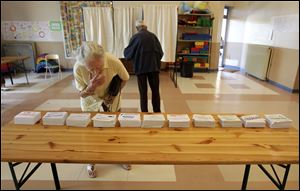
Socialists, conservatives neck-and-neck in French parliamentary vote
6/10/2012
A French citizen looks at ballots paper before voting, in a polling station in Nice, southern France, in the first round of the French parliamentary elections to elect the 14th National Assembly of the 5th Republic.
PARIS — Leftist candidates won strong support in the first round of parliamentary elections Sunday, according to polling agencies, in a vote that is crucial to President Francois Hollande’s Socialist agenda.
Hollande needs leftists to take control of the lower house of parliament — currently dominated by conservatives — to carry out his plans to redirect France’s economy, with repercussions around debt-laden Europe.
It remains uncertain who will end up in control of the National Assembly after the decisive second round of voting June 17. But some important trends emerged.
Projections from four French polling agencies show diminished support for former President Nicolas Sarkozy’s conservative UMP party compared to the last elections in 2007, and growing support for the left.
“It’s a good result tonight ... but we have to remain mobilized for the second round,” said Foreign Minister Laurent Fabius, an influential Socialist.
The TNS-Sofres, CSA, Ipsos and Ifop polling agencies estimate that Socialists and their allies won between 31 percent and 35 percent of the vote Sunday, while UMP candidates and their allies won between 34 percent and 35 percent.
Other leftist parties expected to back Hollande won another 12 percent to 13 percent of the vote, the polling agencies estimated.
Candidates of Marine Le Pen’s far-right National Front party were projected to win between 13 percent and 14 percent of the vote in the first round. It remains unclear whether extreme right candidates can garner enough support in the second round to land seats in parliament, given the stigma against a party whose founder has been convicted of racism and anti-Semitism.
The polling agency projections are based on actual vote results in select polling stations nationwide. They were largely in line with pollsters’ predictions ahead of the vote.
Partial official results were expected Sunday night.
Candidates who win more than 50 percent in the first round win the seat outright. Many races go to a second round, involving any candidate who garners more than 12.5 percent of the registered voters in the first round.
The result will affect whether Hollande can push his tax-the-rich, down-with-austerity agenda, and how much of a voice the far right will have in policies on immigration and Muslim practices.
The National Front, buoyed by Le Pen’s strong third-place showing in the spring presidential race, is looking to build a presence in parliament for the first time since the 1980s. Her aims of undoing the euro currency, shrinking immigration, protecting “Frenchness” and fighting what she calls Islamization have won her fans among French voters who fear globalization, and among extreme right movements around Europe.
The new lower house serves for the next five years, coinciding with Hollande’s five-year term.
France’s 46 million voters are choosing representatives for all 577 seats in the Assemblee Nationale.
The results of France’s parliamentary elections could have repercussions beyond its borders, notably Hollande’s push against German-championed austerity measures for indebted European governments. But voters casting ballots Sunday were focusing more on local issues.